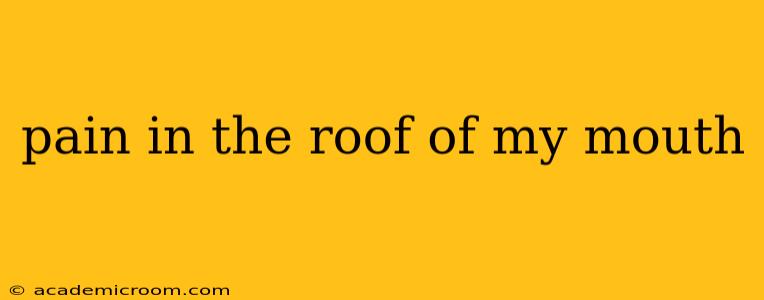Experiencing pain in the roof of your mouth, also known as the palate, can be incredibly uncomfortable and disruptive. This pain can range from a mild ache to a sharp, throbbing sensation, and its cause can vary widely. Understanding the potential reasons behind this discomfort is crucial for effective management and treatment. This comprehensive guide will explore the common causes, accompanying symptoms, and available treatment options for pain in the roof of your mouth.
What Causes Pain in the Roof of My Mouth?
The causes of palate pain are diverse and can be categorized into several groups:
Infections:
-
Oral Thrush (Candidiasis): A fungal infection caused by Candida albicans, often presenting as white patches or creamy lesions on the palate, accompanied by burning or soreness. This is particularly common in individuals with weakened immune systems, those taking antibiotics, or wearing dentures.
-
Viral Infections: Viral infections like the common cold or herpes simplex virus can sometimes cause painful sores or blisters on the palate.
-
Bacterial Infections: While less common, bacterial infections can also lead to palate pain, often manifesting as abscesses or gum infections that spread.
Injuries:
-
Burns: Hot food or drinks, or even accidentally biting the roof of your mouth, can cause painful burns and blisters.
-
Trauma: Physical injuries from falls or accidents can lead to bruises, cuts, or more serious damage to the palate.
-
Irritation from Dentures or Orthodontic Appliances: Ill-fitting dentures or braces can cause friction and irritation, resulting in sores and pain.
Other Medical Conditions:
-
Mouth Sores (Aphthous Ulcers): These painful, shallow ulcers can appear anywhere in the mouth, including the palate. Their cause isn't fully understood, but stress, hormonal changes, and vitamin deficiencies are potential contributing factors.
-
Dry Mouth (Xerostomia): Lack of saliva can lead to discomfort and dryness in the mouth, including the palate. This is often associated with certain medications, medical conditions, or aging.
-
Sjögren's Syndrome: This autoimmune disease affects the moisture-producing glands, resulting in dry mouth and eyes, often accompanied by palate pain.
-
Systemic Diseases: In rare cases, palate pain can be a symptom of underlying systemic illnesses such as lupus or other autoimmune disorders.
-
Allergic Reactions: Certain foods or substances can trigger allergic reactions in the mouth, manifesting as swelling, itching, or pain.
What Are the Symptoms of Pain in the Roof of My Mouth?
The symptoms accompanying palate pain can vary depending on the underlying cause, but may include:
- Sharp, burning, or throbbing pain: The intensity can range from mild to severe.
- Redness, swelling, or inflammation: The affected area may appear visibly inflamed.
- White or yellow patches: These could indicate a fungal or bacterial infection.
- Blisters or sores: These can be small and shallow or larger and more painful.
- Difficulty swallowing or chewing: Pain may make it difficult to eat or drink.
- Bad breath (halitosis): Infections can often cause a foul odor.
- Fever or chills: These are indicative of a more serious infection.
How is Pain in the Roof of My Mouth Diagnosed?
Diagnosis typically involves a thorough examination by a dentist or doctor. They will ask about your medical history, symptoms, and lifestyle, and perform a visual inspection of your mouth. Depending on the suspected cause, further tests such as blood tests or cultures may be necessary.
What are the Treatments for Pain in the Roof of My Mouth?
Treatment depends heavily on the underlying cause:
- Oral Thrush: Antifungal medications (oral or topical) are usually effective.
- Viral Infections: These often resolve on their own, but antiviral medication may be necessary in some cases.
- Bacterial Infections: Antibiotics are used to treat bacterial infections.
- Mouth Sores: Over-the-counter pain relievers and topical anesthetics can provide relief.
- Burns: Cool compresses and avoiding hot foods can aid healing.
- Denture or Appliance Irritation: Adjustments to dentures or braces can alleviate the pressure and friction.
- Dry Mouth: Increasing fluid intake, using saliva substitutes, and addressing underlying causes can help.
In cases of severe pain, chronic conditions, or persistent symptoms, consulting a healthcare professional is crucial for appropriate diagnosis and treatment.
How Can I Prevent Pain in the Roof of My Mouth?
Practicing good oral hygiene, including regular brushing and flossing, is essential for preventing many causes of palate pain. Avoiding extremely hot foods and drinks and maintaining a healthy immune system also play a role. If you wear dentures, ensure they fit properly and are cleaned regularly.
Is pain in the roof of my mouth a sign of cancer?
While rare, pain in the roof of your mouth can be a symptom of oral cancer. However, many other, far more common conditions cause similar pain. If you experience persistent or unexplained pain, especially if accompanied by other symptoms like a lump, swelling, or bleeding, it's crucial to see a doctor or dentist for a proper diagnosis. Early detection of oral cancer is key to successful treatment.
Can stress cause pain in the roof of my mouth?
Stress can indeed exacerbate existing conditions like mouth sores (aphthous ulcers) and contribute to the development of pain. While stress isn't a direct cause of palate pain in itself, managing stress through techniques such as relaxation exercises, yoga, or meditation can contribute to overall oral health and potentially reduce pain.
This information is for general knowledge and does not constitute medical advice. Always consult a healthcare professional for diagnosis and treatment of any medical condition.
